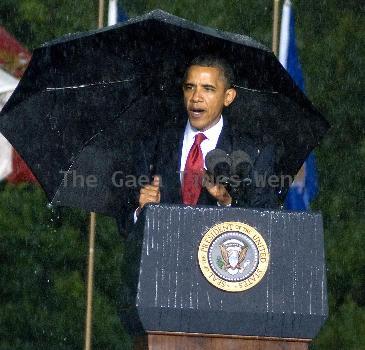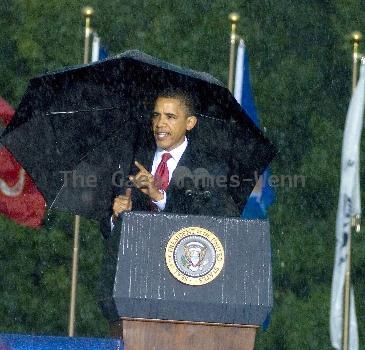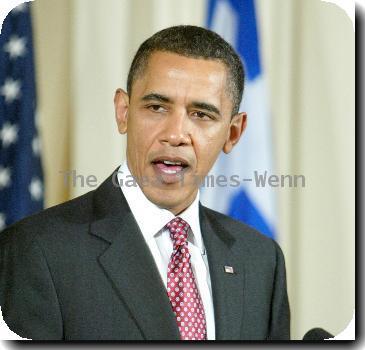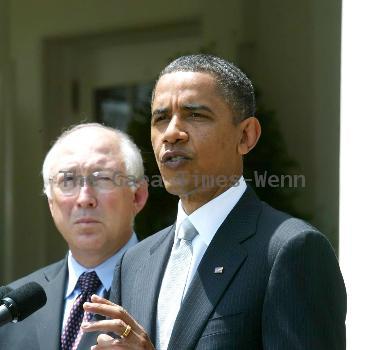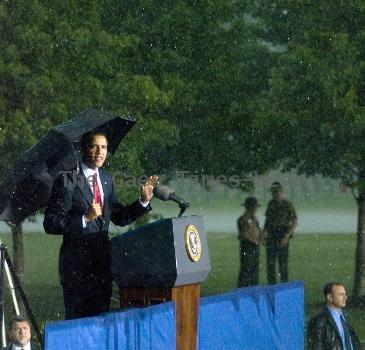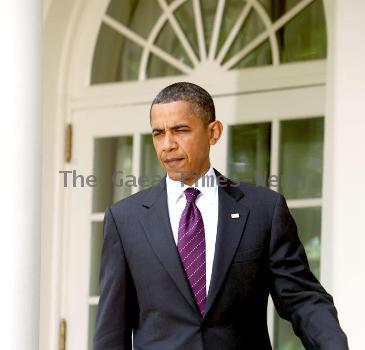AP-GfK Poll: Political environment improves for Republicans over course of primary season
By Liz Sidoti, APWednesday, September 15, 2010
AP-GfK Poll: Climate for GOP keeps getting better
WASHINGTON — Tilted toward the GOP from the start of the year, the political environment has grown even more favorable for Republicans and rockier for President Barack Obama and his Democrats over the long primary season that just ended with a bang.
With November’s matchups set and the general election campaign beginning in earnest Wednesday, an Associated Press-GfK poll found that more Americans say the country is headed in the wrong direction than did before the nomination contests got under way in February. Also, more now disapprove of the job Obama is doing. And more now want to see Republicans in control of Congress rather than the Democrats who now run the House and Senate.
The country’s pessimism benefits the out-of-power GOP, which clearly has enthusiasm on its side. Far more people voted this year in Republicans primaries than in Democratic contests, and the antiestablishment tea party coalition has energized the GOP even as it has sprung a series of primary surprises.
“We’re definitely in a stronger position than we’ve been in really at any point this year,” Sen. John Cornyn, who leads the effort to elect Senate Republicans, said in an interview.
Said Senate Minority Leader Mitch McConnell: “Turnout and enthusiasm are off the charts.”
Indeed, Republicans expected turnout of 30,000 to 40,000 in Delaware on Tuesday. Some 57,582 people showed up to vote as tea party-backed Christine O’Donnell upset moderate Rep. Mike Castle for the Senate GOP nomination. By most accounts, the outcome diminished Republican chances of winning former Vice President Joe Biden’s seat. But Republicans got their preferred candidate in New Hampshire as former state Attorney General Kelly Ayotte fended off tea party-supported Ovide Lamontagne by a razor-thin margin.
Fueling voter anger is an unemployment rate that’s hovered near 10 percent all year despite efforts by Obama and fellow Democrats to accelerate the economic recovery.
“I’m going to do everything in my power to make sure that they’re out of office,” said independent voter Robbin Payton of Newport News, Va., reflecting just how toxic the environment is for the party in power.
Overall, it’s an extraordinarily dreary backdrop for Obama’s beleaguered party. And with just seven weeks until Election Day, Democrats are running out of options to mitigate widespread expected losses of House, Senate and governor’s seats from coast to coast on Nov. 2.
“The reality is if you take the 30,000-foot view, it doesn’t probably look that inviting,” Sen. Robert Menendez of New Jersey, who leads the committee charged with electing Senate Democrats, said in an interview. “If you take the state-by-state view … it’s far more beneficial to us” because in places like Delaware “Republicans have chosen extremists to be their nominees.”
In the House, Speaker Nancy Pelosi predicted that the Democrats would keep control. But, underscoring the woes facing Democrats, she stopped short of the kind of confidence she’s shown in past campaigns when her party had a political tail wind.
“I am not yielding one grain of sand. I want to have the same big, strong majority that we have,” said Pelosi, D-Calif.
As Illinois kicked off the primary season Feb. 2, there was little talk even among Republicans that power in the House was in reach, much less in the Senate. But the national landscape has only has worsened for Democrats.
Back then:
—The unemployment rate was 9.7 percent; it’s 9.6 now.
—Half of the country said in January that the country was on the wrong track; 57 percent say that now in the new AP-GfK poll.
—About 42 percent of the country disapproved of Obama’s job performance; half does now.
—Democrats had a 49 percent to 37 percent advantage over Republicans on the party that voters want to see control Congress; the GOP now enjoys a 55-39 lead among likely voters.
Republicans have steadily gained ground on economic issues and now have a slight advantage on handling the economy, the federal deficit and taxes. They improved their standing in the past month even as Obama stepped up his efforts to persuade the public to give Democratic solutions more time to work.
At the same time, 40 percent of likely voters call themselves tea party supporters, and most of them lean toward Republicans while nearly two-thirds have a deeply negative impression of Democrats. That means the GOP could be in strong shape on Nov. 2 if tea party backers turn out and vote Republican. That’s what they’ve been doing so far this year: The grass-roots, antiestablishment movement can claim wins in at least seven GOP Senate races, a handful of Republican gubernatorial contests and dozens of House primary campaigns.
Also, Obama’s job-performance standing on the economy is at a low point, and a majority of people now say they will consider their feelings about him when they vote for Congress this fall.
“I don’t care for what the man is doing. I think he’s leaving a lot of Americans behind,” said independent Larry Schmidt, 61, of Shingletown, Calif. He says he’ll back a Republican, if he even votes.
The House is most at risk of changing hands.
Upward of 75 races are competitive, most held by Democrats. Republicans need to gain 40 seats to seize control.
Most vulnerable are conservative-to-moderate Democrats in districts John McCain won in the 2008 presidential campaign, and other Democrats who rode Obama’s coattails, benefiting from participation spikes among young and minority voters.
The GOP needs a 10-seat gain for Senate control, a tall order.
Republicans and Democrats alike say that quest got even more difficult Tuesday in Delaware when O’Donnell won the GOP nomination. Democrats had all but written off that Senate seat when it was assumed that Castle would be the nominee, but now they say they’re favored, and many Republicans agree.
Nonetheless, the National Republican Senatorial Committee is sending O’Donnell’s campaign the maximum possible donation, $42,000, and former Massachusetts Gov. Mitt Romney, a potential presidential candidate in 2012, is kicking in $5,000 from his political action committee.
The GOP still is virtually assured to pick up a North Dakota seat. Republicans also could overtake vulnerable incumbent Sens. Blanche Lincoln in Arkansas and Michael Bennett in Colorado, as well as Senate Majority Leader Harry Reid in Nevada. Among other Democratic-held seats: GOP candidates are leading comfortably in Indiana and Pennsylvania, and Republicans are competitive in Illinois, Connecticut, California, Washington, Wisconsin and West Virginia.
Republicans also have an advantage in states where they are defending seats they now hold that are coming open: Florida, Ohio, Kentucky, Missouri and New Hampshire.
With less than two months to go, Democrats are focused on slowing a GOP wave that could give Republicans control of Congress and on trying to fire up their deeply dispirited Democratic base while stemming the flood of independents who now are leaning strongly toward the GOP.
They haven’t gained traction with warnings that electing Republicans would mean a return to George W. Bush’s policies. Now, Democrats are trying a different tack by elevating — and subsequently tearing down — House GOP leader John Boehner, the likely House speaker should Republicans win control. They’re also pouring millions of dollars into advertising designed mostly to make GOP candidates unacceptable instead of highlighting their own accomplishments.
But there’s no certainty any of those tactics will work.
For now at least, Republicans are simply selling themselves as something other than the status quo. And, if the antiestablishment results of the primary season are any measure, it may just work.
The AP-GfK Poll was conducted Sept. 8 to 13, 2010 by GfK Roper Public Affairs and Corporate Communications. It involved landline and cell phone interviews with 1, 000 adults nationwide, and has a margin of sampling error of plus or minus 4.2 percentage points for all adults, 4.5 for registered voters and 5.7 for likely voters.
Associated Press Polling Director Trevor Tompson, AP Deputy Polling Director Jennifer Agiesta, AP News Survey Specialist Dennis Junius and AP Writers Jennifer C. Kerr, Laurie Kellman and Natasha Metzler contributed to this report.
Online: www.ap-gfkpoll.com
(This version CORRECTS McConnell is the Senate minority leader, not majority leader.) )
Tags: 2010 United States General Election, Barack Obama, California, Campaigns, Christine, Delaware, Events, General Elections, Labor Economy, North America, Ohio, Political Fundraising, Political Organizations, Political Parties, Public Opinion, United States, United States General Election, Washington



